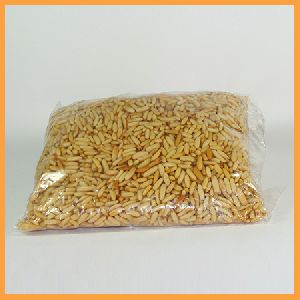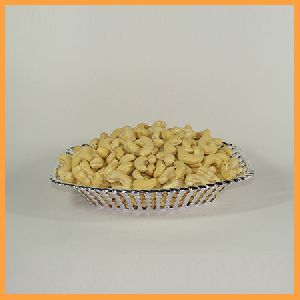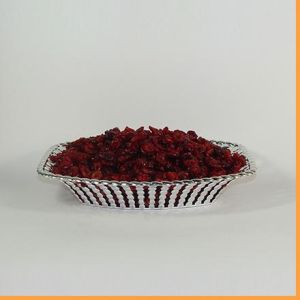
Pine Nuts Kernel
Product details Crunchy yet butter textured, pleasantly sweet and delicious pine nuts are small edible seeds of the female cone in a pine tree. Pine kernels are, indeed, a splendid source of plant derived nutrients, essential minerals, vitamins and "heart friendly" monounsaturated fatty acids that help benefit in reducing cholesterol levels in the blood. Pine nuts are one of the calorie-rich edible nuts. 100 g of dry kernels provide 673 calories. Additionally, they comprise of numerous health promoting phytochemicals, vitamins, antioxidants, and minerals.
...more
macadamia
2,800 Per Kilogram
In a 100-gram amount, macadamia nuts provide 740 Calories and are a rich source (20% or more of the Daily Value, DV) of numerous essential nutrients, including thiamin (104% DV), vitamin B6 (21% DV), manganese (195% DV), iron (28% DV), magnesium (37% DV), and phosphorus (27% DV) (table). Macadamia nuts are 76% fat, 14% carbohydrates, including 9% dietary fiber, and 8% protein. Compared with other common edible nuts, such as almonds and cashews, macadamias are high in total fat and relatively low in protein. They have a high amount of monounsaturated fats (59% of total content) and contain, as 17% of total fat, the monounsaturated fat, omega-7 palmitoleic acid. The trees are also grown as ornamental plants in subtropical regions for their glossy foliage and attractive flowers. Macadamia species are used as food plants by the larvae of some Lepidoptera species, including Batrachedra arenosella. Macadamia seeds are often fed to hyacinth macaws in captivity. These large parrots are one of the few animals, aside from humans, capable of cracking the shell and removing the seed.
...more
kaju
Product details Kaju jumbo are rich in copper, zinc, magnesium, iron and phosphorous. Kaju jumbo help lower LDL and increase the carrying capacity for HDL. Kaju jumbo lower your blood pressure with the help of magnesium present in them. Like calcium, magnesium is also important for bone health which is the main content in Kaju jumbo. Those who eat Kaju jumbo at least twice a week gain less weight when compared to those who eat less.
...more
Gooseberry
320 Per Kilogram
Product details The health benefits of Gooseberry, also known as Amla, can be partially attributed to its high vitamin C content. Amla enhances food absorption, balances stomach acids, fortifies the liver, nourishes the brain and mental functioning, and supports the heart. It also strengthens the lungs, regulates elimination of free radicals, enhances fertility, helps the urinary system, improves skin quality, and promotes healthier hair. This fruit acts as a body coolant, flushes out toxins, increases vitality, aids in vision care, improves muscle tone, and acts as an antioxidant.
...more
gojiberries
1,500 Per Kilogram
Product details The goji berry, also called the wolfberry, is a bright orange-red berry that comes from a shrub that's native to China. In Asia, goji berries have been eaten for generations in the hope of living longer. Over time, people have used goji berries to try to treat many common health problems like diabetes, high blood pressure, fever, and age-related eye problems. Goji berries are eaten raw, cooked, or dried (like raisins) and are used in herbal teas, juices, wines, and medicines. Price per weight
...more
Cranberries sliced
640 Per Kilogram
Product details These plump and delicious cranberries might make you cry from their beauty. This delicious dried fruit has a distinctive taste perfect for snacks and exceptional for muffins, breads, and cereals. Slightly sweetened. Cranberries are a very good source of vitamin C, dietary fiber, and manganese, as well as a good source of vitamin E, vitamin K, copper and pantothenic acid. Freeze cranberries and float as ice cubes in a holiday drink. Fill a pitcher with equal parts cranberry juice and sparkling wine or Prosecco. Add a few frozen cranberries to each Champagne flute, then top with the cranberry cocktail. These are just right for decorating a cake.
...more
Brazilnut
2,900 Per Kilogram
Product details One of the most controversial and beneficial aspects of Brazil nuts is their surprisingly high content of healthy unsaturated fats, commonly known as HDL or good forms of cholesterol or omega-3 fatty acids. This includes oleic acid and palmitoleic acid. These varieties of unsaturated fats have been connected with balancing the cholesterol profile of the body and improving heart health, mainly by eliminating dangerous omega-6 fatty acids from the body and cardiovascular system. Even though their ability to balance cholesterol levels can help prevent atherosclerosis, heart attacks, and strokes, we can’t overlook the presence of high amounts of dangerous saturated fat in Brazil nuts. So, be careful and don’t consume these nuts in excess, as they are also high in calories. The recommended serving size of this beneficial snack is about six average-sized nuts.
...moreBe first to Rate
Rate ThisOpening Hours